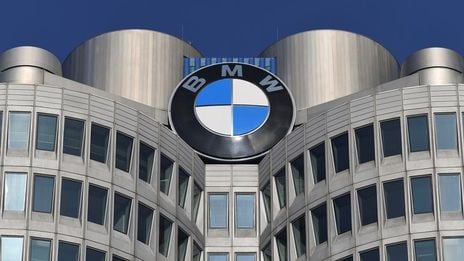MUNICH (dpa-AFX) - BMW is showing a near-production car of its all-electric "New Class," which will be launched in 2025, for the first time at the IAA in Munich. CEO Oliver Zipse said at the preview premiere on Saturday that range and charging speed are 30 percent better than those of today's electric cars. The entire vehicle architecture is now fully geared to electric drive, he said, and because the removal and recycling of all components is already planned during development, the cars are also more environmentally friendly.
BMW is already not generally earning less money with its electric cars than with its gasoline and diesel cars, Zipse said. Production is more expensive, costs are higher - but "the assumption that combustion engines are always more profitable than electric cars is completely wrong," he said. "We make money with every electric car today, and that will be even more the case with the New Class. It will be very profitable." With software building blocks for the powertrain, chassis, electrical system and driver assistance, for example, the new generation of vehicles will save wiring harnesses, weight and money.
As a vision vehicle, BMW presented not a sport utility vehicle (SUV), but a mid-size sedan the size of today's 3 Series. The first model of the New Class, however, would be an SUV from the new BMW plant in Debrecen, Hungary, at the end of 2025. Almost at the same time, the second model will start up at the main plant in Munich in early 2026, and then other cars based on this architecture will quickly follow, Zipse said. A smaller BMW is also planned, he said.
BMW does not want to set the purchase price for the cars until shortly before the start of series production. "We will not price ourselves out of the market," Zipse said. There is a price war today, he said, especially in China, with many new carmakers and inexpensive e-vehicles. In the premium segment, he said, the price pressure is less noticeable; different rules of the game apply there. In China, BMW sales grew by four percent in the first half of the year.
Tesla is just leaving the premium segment and moving into the volume segment, Zipse said. BMW, on the other hand, is maintaining its prices and market share.
BMW plans to sell 15 percent of its cars with e-drives this year, rising to 33 percent by 2026. The timing for the launch of the "New Class" in 2025 is "spot on" because the industry is just on the verge of a technological leap, Zipse said. The battery is making a giant leap, he said, and demand for e-cars will pick up significantly in the middle of the decade.
However, demand for internal combustion cars will remain very high worldwide for a long time, he said. In contrast to pure e-car manufacturers, BMW can also meet this demand and will continue to grow, Zipse said.
Several Chinese automakers are showing their e-vehicles for the first time at the IAA. At the show, Zipse will speak at a forum Wednesday with the CEOs of Chinese automakers Saic, BYD, Chonquing and Nio, as well as Mercedes-Benz and Volkswagen CEOs Ola Källenius and Oliver Blume.
Whether Chinese carmakers will gain a foothold in Europe like the Japanese did in the 1970s and the South Koreans did afterward is an open question, Zipse said. But they have a cost advantage and are very strong in software, he said. The basic segment may no longer be served by European manufacturers with the e-car, he said. But "a BMW drives differently than a Chinese vehicle. It's not that easy to reach the top of this industry," Zipse said. Chinese manufacturers would have to build brands, sales and service networks. They have the potential to be aggressive on price, he said, but are not currently doing so.
In Munich, BMW's New Class vision car will be on display in the free-access IAA areas in the city center starting Tuesday. BMW had once used the term Neue Klasse for the BMW 1500 compact sedan, which was introduced at the 1961 IAA and saved the floundering company at the time. Now, at BMW, the term stands for the Group's transition to electromobility, digitalization and the circular economy./rol/DP/he













